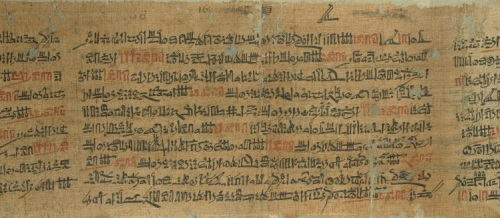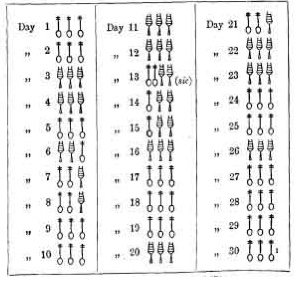Those Born on the 5th Day of Paophi Die of Excessive Venery
“The calendars of lucky and unlucky days do not, however, always agree as to a given day. Thus in the list given above the 20th day of Thoth is marked wholly unlucky, but in the papyrus Sallier IV it is wholly lucky, but the reader is told not to do any work in it, nor to slay oxen, nor to receive a stranger; on this day the gods who are in the following of Râ slew the rebels.
Concerning the fourth day of the next month, Paophi, the papyrus Sallier IV says, “Go not forth from thy house from any side of it; whosoever is born on this day shall die of the disease aat.”
Concerning the fifth day it says, “Go not forth from thy house from any side of it, and hold no intercourse with women. This is the day wherein all things were performed in the divine presence, and the majesty of the god Menthu was satisfied therein. Whosoever is born on this day shall die of excessive venery.”
Concerning the ninth day it says, “Whosoever is born on this day shall die of old age,” and concerning the fifteenth, “Go not forth from thy dwelling at eventide, for the serpent Uatch, the son of the god, goeth forth at this time, and misfortunes follow him; whosoever shall see him shall lose his eye straightway.”
Again, the twenty-sixth day of Paophi was a lucky day for making the plan of a house; on the fifth day of Hathor no fire was to be kindled in the house; on the sixteenth day it was forbidden to listen to songs of joy because on this day Isis and Nephthys wept for Osiris at Abydos; a man born on the twenty-third day would die by drowning; and so on.
E.A. Wallis Budge, Egyptian Magic, London, 1901. Pp. 226-8.




